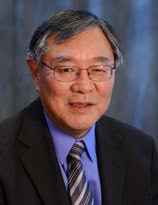 Dr. Paul Watanabe (courtesy of U.S.-Japan Council)
Dr. Paul Watanabe (courtesy of U.S.-Japan Council)Growing up, Dr. Paul Watanabe saw few people of his ancestry in U.S. professions outside of wage-earning jobs.
Tens of thousands of Japanese-Americans, including his parents, had been herded into government-run incarceration camps during World War II. Many lost homes, businesses and most of their belongings, forcing them to start from scratch after the war.
So it wasn’t surprising that the young Watanabe’s attention settled on two Japanese-Americans who became nationally prominent in the 1960s: George Takei, the actor behind Mr. Sulu on the original “Star Trek” television series, and U.S. Sen. Daniel Inouye, D-Hawaii, a combat veteran who in the 1970s questioned top White House aides during investigative hearings in the Watergate scandal and who cultivated a reputation for bipartisan approaches to behind-the-scenes politics.
Acting didn’t interest Watanabe, but he grew intrigued by politics and public policy while following Inouye’s career.
A University of Utah student activist during the tumultuous 1960s and ‘70s, Watanabe dropped plans to apply to law school. After earning a doctorate in political science, he began teaching full-time in 1978 at the University of Massachusetts, Boston, where he is currently an associate professor in political science.
“I grew up in a poor mining town in Utah so I understood economic and racial differences,” Watanabe says. “Universities are the center of social change. A person can be part of that change, and that’s why I have been in academia my whole adult life.”
His research includes American foreign policy and American political behavior. He is a commentator in news and on-air reports during election season, whether for statewide or presidential races. He has also researched ethnic group politics and Asian Americans.
As director of UMass Boston’s Institute for Asian American Studies, Watanabe’s research is intended to strengthen and further Asian American involvement in political, economic, social and cultural life.
Among other endeavors, the Institute has produced reports examining the giving patterns of Asian American political donors as well as civic engagement among low-income, Asian American young adults. Beyond political behavior, the Institute has published reports about English-language acquisition among immigrants and social services and housing options for elderly Asian Americans.
“Less is known about Asian Americans than any other racial group, resulting in misunderstanding and unfair stereotyping,” Watanabe notes. “Too many people don’t believe that Asian Americans suffer economic and educational disadvantages.”
Research of Asian Americans can become painstaking. It’s common for Watanabe and his colleagues to identify, one at a time, each registered voter they believe to be Asian American from rolls containing the names of voters across all racial groups. They cull databases for Asian surnames.
Problems arise, however, with surnames like “Lee” and “Park,” which are common among Korean-Americans but also occur among Whites and African-Americans. If the voter has a first name such as Eun-Kyung, the UMass researchers presume she is of Korean descent. A Westernized name such as Sally, however, calls for searching the database for another person in the household, which still might be identified as Korean-American depending on first names that are found.
Watanabe’s research has also explored wartime, Japanese-American diaspora. A National Park Service grant enabled him and others to secure oral histories of elderly Japanese-Americans who were allowed to leave incarceration camps as young adults in order to attend college.
The researchers recorded the little-known recollections of 18 people who moved to far-flung college towns where, quite often, no other person of Japanese descent lived. Their recollections are now digitally available to the public on the UMass Boston Institute’s website, and Watanabe often hears from people who are neither students nor professional scholars who have found the story collection illuminating.
“Paul’s thoughtful, articulate voice has resonated deeply with the widest range of constituencies possible—from grassroots community activists to state higher education officials to national Asian American research and policy advocates,” says Dr. Peter Kiang, a UMass Boston professor of cultural studies, social studies and multicultural education. “Paul’s contributions have been immeasurable.”
Watanabe laments the scarcity of free-standing, Asian American, research institutes nationally, which he believes lingers in the single digits. UMass Boston’s Institute was established more than 20 years ago, and Watanabe had hoped many more would emerge among universities. He blames this shortage on the same stereotypes and misperceptions about Asian Americans that fuel the institute’s work.
However, he still harbors hope that will change, just as UMass Boston and other universities now employ an increasing number of scholars specializing in Asian American studies, a field that was in its infancy when his career began. “If one area can change, so can others,” Watanabe says.


















